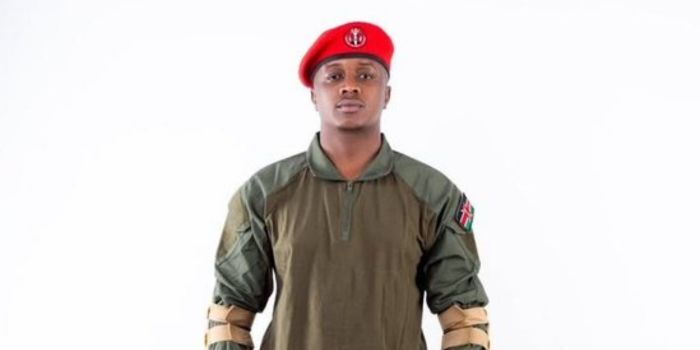Cop Shakur Walks Away from Anti-Government Movement
Jackson Kihara, better known by his nickname Cop Shakur, has officially stepped down from the Fighting Brutality and Impunity (FBI) movement, just weeks after joining the controversial group.
In a statement issued on Tuesday, August 26, the former prison officer and now outspoken activist revealed that he had made the difficult choice to leave the movement, which is led by ex-Kenya Defence Forces (KDF) Special Forces soldier Patrick Osoi.
Shakur clarified that his decision had nothing to do with conflicts inside the organisation. Instead, he explained that he wanted to follow his own personal path and focus on his broader vision for justice and reform in society.
“After taking time to reflect, I have made the decision to step away from the Fighting Brutality and Impunity movement,” he said. “This should not be seen as me rejecting what the FBI stands for. It is simply a matter of choosing a new direction that fits my own values and principles.”
He added that he had already informed both Osoi and Police Constable Hiram Kimathi of his move and wished the organisation well as it continues its campaigns.
Shakur also reaffirmed his commitment to continue advocating for social justice, human rights, and police accountability in his own way.
How the ‘FBI’ Movement Was Formed
The Fighting Brutality and Impunity (FBI) group was launched in July 2025 by Patrick Osoi, a man with a decorated yet controversial past. Osoi had served in the KDF Special Forces, worked with the National Intelligence Service (NIS), and even spent time in the US Army.
According to Osoi, the group’s purpose was to defend victims of extrajudicial killings, amplify the voices of those seeking justice, and stand by police officers who faced punishment for refusing to carry out illegal orders.
“Having served as a KDF Special Forces soldier, NIS officer, and US Army veteran, I felt it was necessary to create a movement called Fighting Brutality and Impunity (FBI),” Osoi explained during the group’s unveiling.
He stressed that the organisation was not just about protests but about giving dignity to victims of rogue policing, supporting families that have lost loved ones, and ensuring that disciplined officers who refused to betray their oath were not abandoned by the state.
Recruitment of Members and Rising Tensions
One of the first people to join Osoi was Cop Shakur, who had already become a familiar figure among Kenyans after he openly participated in the June 2024 anti-Finance Bill demonstrations.
His bold decision to stand with protestors led to his suspension from the Prisons Service and later his dismissal from duty, cementing his reputation as a whistleblower and activist.
Another high-profile recruit was Police Constable Hiram Kimathi. Kimathi defied his seniors when he refused to obey what he described as a “shoot order” against demonstrators.
Following his stand, he was abruptly transferred from Kyumbi Police Station, near Machakos Junction, to Todonyang Police Station at the Kenya–Ethiopia border, a posting he strongly criticised as punishment.
Through these symbolic memberships, Osoi hoped to create a strong front of former security officers who understood the struggles both within the police force and among ordinary Kenyans facing injustice.
Crackdown by Authorities
However, the creation of the FBI movement quickly attracted the attention of authorities. Shortly after its launch, Osoi was arrested when police raided his home. His colleagues, Shakur and Kimathi, also faced separate arrests in what many saw as an attempt by the state to silence the movement before it gained more influence.
Though all three were later released, the arrests highlighted the risks that come with challenging government authority and standing up against police brutality.
What Shakur’s Exit Means
Shakur’s exit from the FBI movement raises questions about the future of the organisation. While he insists that his departure is about personal direction and not internal conflict, his absence could weaken the momentum the group was beginning to build.
Still, both Shakur and Osoi appear determined to continue championing justice, whether together or separately. For ordinary Kenyans, the fight against brutality, corruption, and impunity remains ongoing, with activists like them promising not to abandon the cause.
Join Government Official WhatsApp Channel To Stay Updated On time
https://whatsapp.com/channel/0029VaWT5gSGufImU8R0DO30


